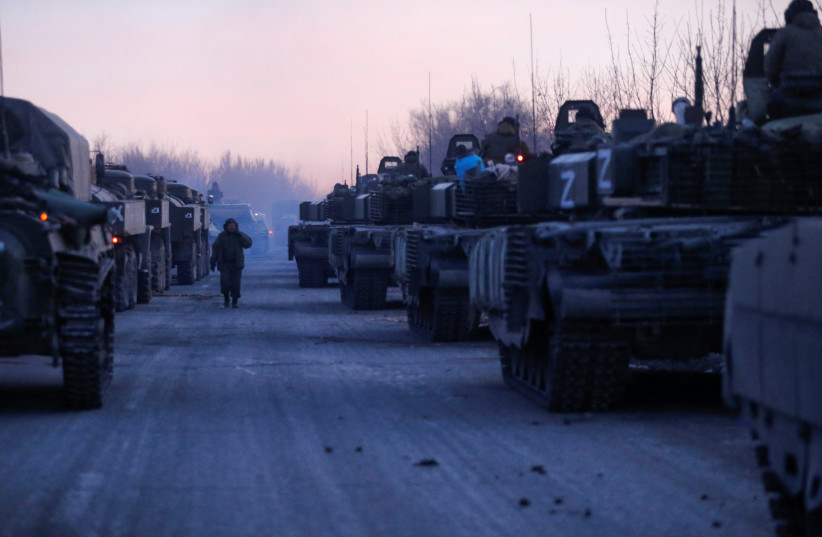Russia is concealing the fact that it is mass mobilizing combat reserves and conscripting Chechen convicts to replenish its forces in Ukraine, the Ukrainian Intelligence Directorate (GUR) alleged on Tuesday.
GUR asserted starting April 1, Russia will mobilize reservists throughout the federation at the same time as scheduled conscription, to "cover for a large number of mobilized people who will arrive at military enlistment offices." The directorate claimed that 100,000 Russians had signed contracts under the BARS-2021 military reserves program that will supposedly be utilized.
Concurrently, as part of the same military reserves program, Russia is allegedly recruiting convicts from the Chechen Chernokozovo penal colony. GUR claimed that 100 prisoners with serious criminal convictions — including robbery, murder and drug trafficking — have been promised full amnesty in exchange for enlistment, and if they returned alive from the war. GUR reported that criminals who agreed to join the military were not allowed to inform their families. The intelligence body also said that those convicted of political crimes were not offered the deal.
The Chechen convicts are allegedly already preparing to be deployed to Ukraine, and the supposed mobilization of reservists will also be sent on an indeterminate date to join Russian troops already fighting.
The enlistment of convicts is not without precedent in the Russia-Ukraine War — Ukrainian president Volodymyr Zelensky announced on February 28 that prisoners with military experience would be released if they agreed to join the fight against Russia. Nor would the participation of Chechens in the war be unprecedented.

Ramzan Kadyrov, the leader of Russia's Chechnya region and an ally of Russian President Vladimir Putin said on February 26 that his fighters had been deployed to Ukraine, and boasted that his units had suffered no losses. This quickly changed, when at the beginning of March Kadyrov admitted that two Chechen servicemen had been killed. Around the same time Chechen general Magomed Tushayev, who was reportedly responsible for the torture and murder of LGBTQ+ residents of Chechnya, was reported killed in action by the armed forces of Ukraine.
Chechen special forces were also allegedly sent to assasinate Zelensky, Ukraine's National Security and Defense Council Oleksiy Danilov announced on March 1 to Ukrainian parliament's official television station Rada TV.
"The special operation that was to be carried out directly by the Kadyrovites to eliminate our president is fully known to us today," Danilov stated.
"One group was covered in Gostomel, another group is now, let's say, under the gun," Danilov continued. "The Kadyrovites' elite group, which came here specifically to eliminate our president, was directly destroyed."
Russia has reportedly also been using mercenaries to supplement its forces in Ukraine. These mercenaries have been reportedly recruited from Libya, Syria, and Serbia, according to the Ukrainian military and intelligence services. On March 11, Russian President Vladimir Putin gave the green light for up to 16,000 volunteers from the Middle East.
They claimed that Russia had opened 14 mercenary recruitment centers in Damascus, Aleppo, Hamma, Raqqa and Deir ez-Zor. Russia is paying foreign mercenaries a monthly salary of $300-600 to fight.
It was also alleged that Russia is hiring Russian mercenaries from the private military company Wagner, and has sent multiple teams as the war has gone on.
British military intelligence said on Monday the Russian private military company, the Wagner Group, has been deployed to eastern Ukraine to shore up Russian forces.
“They are expected to deploy more than 1,000 mercenaries, including senior leaders of the organization, to undertake combat operations,” Britain’s Defense Ministry said.
The report claims that Wagner personnel have been prioritized for the conflict in Ukraine rather than in operations in Africa and Syria. This was motivated by heavy losses and an invasion that has been slowed due to fierce Ukrainian resistance and severe logistical issues.
Russia has been attempting to rotate combat weary troops from other deployment areas. GUR asserted earlier in March that Russian peacekeepers from Nagorno-Karabakh had been transferred to Ukraine. Ukraine claimed on Tuesday that attempts to rotate troops were met with refusal by troops in the Russian Pacific fleet.
Russia has in the past denied that conscripts had been used in the invasion of Ukraine.
"I emphasize that conscript soldiers are not participating in hostilities and will not participate in them. And there will be no additional call-up of reservists," Putin said on March 8.
It later acknowledge that conscripts were taking part in the war.
"Unfortunately, we have discovered several facts of the presence of conscripts in units taking part in the special military operation in Ukraine. Practically all such soldiers have been pulled out to Russia," the Kremlin said.
Reuters, Benjamin Weinthal, Tal Spungin, Aaron Reich contributed to this report.
